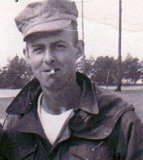By Any Name it's a Miserable Place
 Something, but I'm not sure what, made me think of Camp Polk, an utterally awful place that the Army now calls Fort Polk. Call it what you will, it's the only place I've ever been where a man could find himself waist deep in a bayou with alligators snapping at his butt and ten minutes later be trudging through ankle deep sand in a Sahara-like setting.
Something, but I'm not sure what, made me think of Camp Polk, an utterally awful place that the Army now calls Fort Polk. Call it what you will, it's the only place I've ever been where a man could find himself waist deep in a bayou with alligators snapping at his butt and ten minutes later be trudging through ankle deep sand in a Sahara-like setting.Everyone in the Army during WWII - the big one as Archie Bunker used to call it - heard about Polk and the nearby town of Leesville. Those who had been there warned against going the same way a preacher warns against going to hell, and for much the same reasons. I recalled their words on an unhappy day in late summer of 1951 when told that along with the rest of my National Guard outfit I was headed for Polk. This, we assumed, was the first stop on the way to Korea, where people were shooting at each other. I wasn't sure which sounded worse, Polk or Korea.
Our train pulled into Leesville in late morning. The track ran behind the rear of the jail so we were welcomed to town by women standing nearly naked behind bars, happily waving to us and yelling that they'd see us at the Broken Drum or the Cave or some other of the town's many disreputable dives. This was a big morale booster for some of my younger companions, the 18-and 19-year-olds who called me "Pop" because I was 26. They'd bring their troubles to me, nearly all of them concerning women. I probably gave out more bad advice to the lovelorn than Ann Landers or Dear Abby.
Before leaving home we had been warned against coral snakes, the deadliest in North America. They didn't mention the three varieties of rattlesnakes, the copperheads and the huge number of cottonmouths. Nor was anything said about those alligators, the wild boars that didn't hesitate in charging a company of riflemen, the packs of razorback hogs that enjoyed taking big bites of human flesh. Nor did they say anything about large lizards, tarantulas, black widows or scorpions. They did, however, mention the women in Leesville.
I was the mortar section sergeant, an irritant in itself because the only stripes on my sleeves were those of a corporal. For that I had no one to blame but myself. I had been a staff sergeant but a short time before we were federalized I resigned after a run-in with the company commander. Not knowing we were about to be federalized, of course, and all too soon after I had finally found a good job paying a dollar an hour.
One thing about the military, it isn't necessary that you know how to do something, only that you are capable of ordering someone else to do it. I, for example, had never mastered the use of a mortar's sight. You had to level two bubbles while at the same time lining up the sight on an aiming stake. Level one bubble and the other was off. Level both bubbles and you no longer were lined up on the aiming stake. Line up on the stake and a bubble was off...and on and on and on.
Don't get me wrong, I could do it. In five minutes, maybe ten. That remained a dark secret because a skilled gunner could do the job in seconds. As section sergeant, though, all I had to do was order the others where to set up and then let the squad leaders and gunners take over. That's the tried and true Army way of doing things.
So that's how it went one hot and steamy summer afternoon at Polk. After issuing an order or two I retreated to the shade of a tall tree, checked the immediate area and particularly the place where I was going to sit, then I sat. Leaning back and lighting a cigarette, ready for some serious relaxation, all seemed as well as possible in my world. Then before I had time for a more than a puff or two an ammo bearer came running over and said those most dreaded of all words, "Our shell didn't fire."
That meant the damn thing was stuck in the tube. The drill at such times was for everyone else to withdraw to a safe distance while the section sergeant and squad leader worked to get it out. Once the pin (the same as one on a hand grenade) was pulled a 60mm shell was touchy as hell. The merest contact with its point-detonating fuse and that was all she wrote.
So the squad leader detached the tube from its base plate and slowly raised the back of the tube while the section sergeant cupped his hands around its mouth, making sure nothing could possibly touch that fuse. As the back of the tube got higher and higher you could hear the shell begin to slide forward. From then on it was up to the section sergeant to catch it and re-insert the pin. So that's the way it went.
Once that was done the shell was put back in its container and set aside to turn over to ordnance, then the firing resumed. And I went back to my tree, leaned back and lit up again. That's when an ammo bearer from a different squad came running over and said, "Christy dropped the shell in the tube the wrong direction."
Ah, those were the good old days at Polk.



<< Home